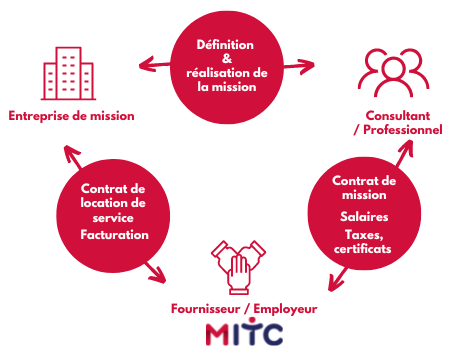Increasingly popular on the job market, wage portage (portage salarial) combines security, independence and flexibility.
Because it involves 3 parties, it is often confused with temporary work.
However, there are many differences between these two types of employment.
This article will give you more details on the similarities and differences between wage portage and temping (temporary work).
Wage portage and temping: what they have in common
The reason they are so often mixed up is that wage portage and temping involve a relationship between 3 parties: the temp or wage portage agency, the client company and the employee.
In both cases, the employee has a sub-contract with the temp agency or wage portage company, but never with the client company.

Wage portage VS temping: the differences
As you can see, wage portage and temping have only one thing in common. For the rest, from recruitment needs to salaries… everything differs.
Two working methods for two types of professionals
Companies generally turn to a temp agency for short- or medium-term replacements, or when there is an increase in activity over a given period.
The majority of temporary gigs do not require any particular skills.
Wage portage is mainly used for executive positions with specific expertise. The client company can call on a wage portage company to carry out market research, launch a new product, develop a business, etc.
Wage portage is particularly popular with qualified retirees looking for additional income.
To each his own legal status
The status of temp is very precarious.
Indeed, the temporary employee accepts several assignments in a row for different companies, in the hope of being offered a permanent contract.
Unfortunately, these contracts very rarely lead to long-term job offers.
Unlike freelancers, workers under wage portage enjoy the status of employees, offering them security while retaining their independence.
It is therefore the “portage” company that takes care of all the administrative and accounting work for the client.
Are you wondering what the benefits are for the client company?
It gets rid of the administrative constraints and costs associated with recruiting a new employee.
From choosing a mission to canvassing clients
Temporary employees do not choose their missions.
If they turn down job offers too often, they run the risk of being forgotten by their agency. Instead, they must be willing to accept the assignments and the terms of the contract offered to them.
Employees under wage portage choose their missions.
They are also the ones who canvass companies looking for a contract.
Please note: contracts must meet the requirements of the wage portage company. The latter pays itself directly from the salaries of its consultants, generally at a rate of 10%.
Wages and work organisation: two types of contract where everything differs
Temporary employees work on the client company’s premises in the same way as other employees. They adapt to the rules and procedures of the company, and are paid a salary based on the current price scale.
Temping salary is non-negociable
Employees working on a wage portage scheme have more freedom. Remember, they approach the companies themselves.
As a kind of external consultant, they set their hourly rate and negotiate the terms of the contract, such as their timetable.
Comparison table between wage portage and temping
| Wage portage | Temping | |
|---|---|---|
| Employer | Wage portage company | Temp agency |
| Type of work sought | Specific, one-off expertise | Temporary workforce. Generally few qualifications required |
| Work contract | Between the “porté” employee and the wage portage company (fixed-term or permanent contract) | Between the temp worker and the temp agency (temporary employment contract) |
| Commercial contract | Between the wage portage company and the “porté” employee’s client (contract for the provision of services) | Between the temp agency and its client company (contract for the provision of personnel) |
| independence | The “porté” employee retains his independence and looks for clients and assignments himself | Temp workers do not choose their missions. However, he can refuse |
| Salary | The “porté” employee negotiates his salary with the client. The wage portage company is responsible for invoicing and remuneration. | The salary is set by the client company on the basis of their internal price scale. |
Wage portage or temping: which should your company choose?
Using the services of a temp agency is ideal if your company is experiencing a sudden surge in activity, such as around an event or the festive season.
If you need specific expertise to develop a particular business sector, launch a new product or run a marketing campaign, you’re better off with a “porté” consultant…
What is certain is that when it comes to choosing between wage portage and temping, the self-employed are increasingly opting for wage portage, which offers many more advantages, both for them and for companies.
Interested in wage portage?




